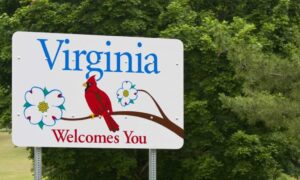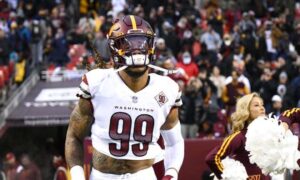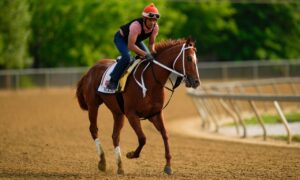
This week, the VA sports betting regulations were officially approved by the Virginia Lottery Board, taking into account significant feedback received during the open comment period.
During a virtual meeting on Tuesday, officials from the VA Lottery approved and released a 69-page document.
During the 56-day comment period, input was gathered from nearly every major sportsbook operator, professional sports leagues, and the general public.
According to the regulations, online sportsbooks have the opportunity to apply for a maximum of seven licenses. Moreover, five licenses will be exclusively reserved for retail casinos in Virginia, which are expected to start offering online sports betting services by 2025.
The Virginia Lottery has given its approval on the regulations, allowing sportsbook operators to submit their applications from October 15th to October 31st.
After a period of 90 days, the VA Lottery Director Executive Director, Kevin Hall, will assess the applications and decide whether or not to grant licenses. It is expected that the initial VA sportsbooks will be available online starting in January.
Let’s take a look at what’s included in the final version of the VA sports betting regulations.
Sports leagues get betting data
At the discretion of the lottery’s executive director, sports leagues were eligible to receive “real-time information sharing for wagers” according to the initial sports betting regulations.
On the other hand, the comment period saw resistance from the NBA, MLB, and PGA.
In the end, the final regulations of the VA Lottery fulfilled the leagues’ desires. Consequently, the leagues now have the ability to obtain official league betting data (including bet amount, type, time of the wager, IP address of the bet, and results) whenever they make a request.
Despite the leagues’ request, lottery officials did not grant approval to amend the definition of a “supplier.”
Despite the potential for change, the final regulations maintain the same definition, thereby requiring leagues such as the NFL and NHL to still obtain a $125,000 supplier license.
A “Sports betting supplier” or simply a “Supplier” refers to an individual or entity that fulfills one or more of the following roles: (a) overseeing, managing, or regulating wagers initiated, received, or placed on a sports betting platform; (b) overseeing, managing, or regulating the games on which wagers are initiated, received, or placed on a sports betting platform; or (c) maintaining or operating the software or hardware components of a sports betting platform, which includes geolocation services, customer integration, and customer account management.
No Olympic betting, no in-state college betting
In accordance with Virginia’s regulations, sportsbooks in VA are prohibited from accepting bets on local colleges and universities, along with youth sports.
In addition, the state of Virginia has prohibited all college sports prop bets. Moreover, wagers involving “potential injuries, unsportsmanlike behavior, or any decisions made by officials” are also not allowed.
DraftKings, the prominent sportsbook industry leader, expressed opposition to another proposed restriction, specifically the prohibition of Olympic betting, amidst the open comment period.
DraftKings officials contended that, similar to other betting limitations, this restriction would incentivize Virginians to venture into states where such wagers are allowed.
Despite this, Gina Smith, VA Lottery Deputy Director for Gaming Compliance, maintained during Tuesday’s meeting that the prohibition on Olympic betting would still be upheld. She justified her stance by highlighting the involvement of minors in Olympic events and the lack of an effective method to identify and exclude such contests.
Smith stated that the board would review the matter again prior to the 2021 Summer Olympics in Tokyo.
Virginia Sports Bettors’ Bill of Rights
The “Sports Bettors’ Bill of Rights” was initially established in Virginia, outlining the rights and safeguards provided to consumers.
The omission from the final regulations is the mandate for sportsbook operators to display the “Virginia Sports Bettors’ Bill of Rights” on their websites and apps. Instead, operators are obligated to provide a link to the document on VALottery.com.
The initial regulations mandated operators to display live betting data, encompassing the overall betting volume on offered wagers and the methodology used to establish the odds.
The operators contended that the information is proprietary and inclusion of such comprehensive data could potentially impair app performance.
In the end, regulators reduced the requirements. Presently, operators are only required to disclose the “amount wagered on the bet,” “the odds offered for the wager,” and “the payout amounts.”
Who is a VA sportsbook ‘principal?’
During the open comment period of the VA Lottery, feedback was provided by ten sportsbook companies. Among them, Caesars, DraftKings, and Penn Interactive (Barstool Sports) specifically asked for a clearer and shorter definition of the term “principal.”
They argued that if the definition is too broad and encompasses numerous employees, the licensing fees for each company “principal” could significantly increase. This is because the VA Lottery mandates a $50,000 background check and licensing fee for every individual associated with the company.
The regulations initially identified principals as individuals who either held a 5% stake in a company or were employed in a managerial role for a sports betting platform on behalf of a permit holder.
The final regulations now provide a clearer definition of a principal. A principal is specifically identified as “the Chief Executive Officer of the permit holder and, if applicable, its sports betting platform supplier.” Additionally, a principal is defined as “any individual who holds ultimate responsibility for the operation of the sports betting platform in Virginia,” although the definition remains somewhat uncertain.
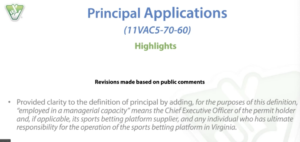
Given the updated language, it is likely that the majority of workers will require a more affordable and straightforward “sports betting employee” license, which can be obtained for $500 each. If sportsbook operators have any queries regarding particular licenses, regulators will permit them to schedule a meeting for clarification.
The licensing costs for each sportsbook consist of an initial issuance fee of $250,000 (with a renewal fee of $200,000), which collectively cover a duration of three years.
Fewer advertising and marketing hurdles
According to the draft regulations, Virginia sportsbook operators would be required to obtain approval from the VA Lottery for all their marketing materials.
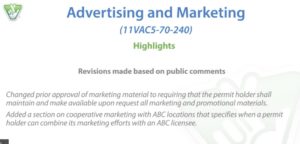
During the open comments, a representative from Penn National expressed concern that such a requirement could be excessive and burdensome. They also pointed out that it could impede a sportsbook’s ability to promptly advertise promotions through traditional and social media channels.
Currently, operators are only required to keep an archive of marketing materials and provide it to the VA Lottery when requested.
In addition, advertising operators are prohibited from targeting individuals under the age of 21. Ads are also not allowed to include students, schools/colleges, or school environments. Furthermore, endorsements cannot be made by minors, college athletes, schools/universities, or athletic associations. To illustrate, the partnership between PointsBet and the University of Colorado in Colorado would be prohibited in Virginia.
The regulations do not provide a clear definition of what qualifies as excessive, but it is important to note that advertising cannot excessively saturate a medium.
Responsible gaming and closing a loophole
Several modifications were made to prioritize responsible gaming and address a potential regulatory loophole.
Bettors in VA can now opt for self-exclusion from gambling by using the VA Lottery website, eliminating the need to access a wagering app.
Customers have the option to select either two- or five-year terms when gambling. Nevertheless, in order to be included in the lifetime exclusion list, individuals must personally visit the Virginia Lottery headquarters located in Richmond.
Furthermore, regulators have made changes to the wording regarding third-party exclusion requests. In order to prevent any possible misuse, operators are now only required to take into account such requests. The regulations do not impose any specific actions for operators to follow.
When bettors added themselves to the self-exclusion list as per the initial regulations, all their pending wagers would be canceled.
If a bet appears to be a guaranteed loss, bettors might exploit the system. The updated wording now mandates operators to reimburse players who choose to exclude themselves by refunding any remaining funds.


